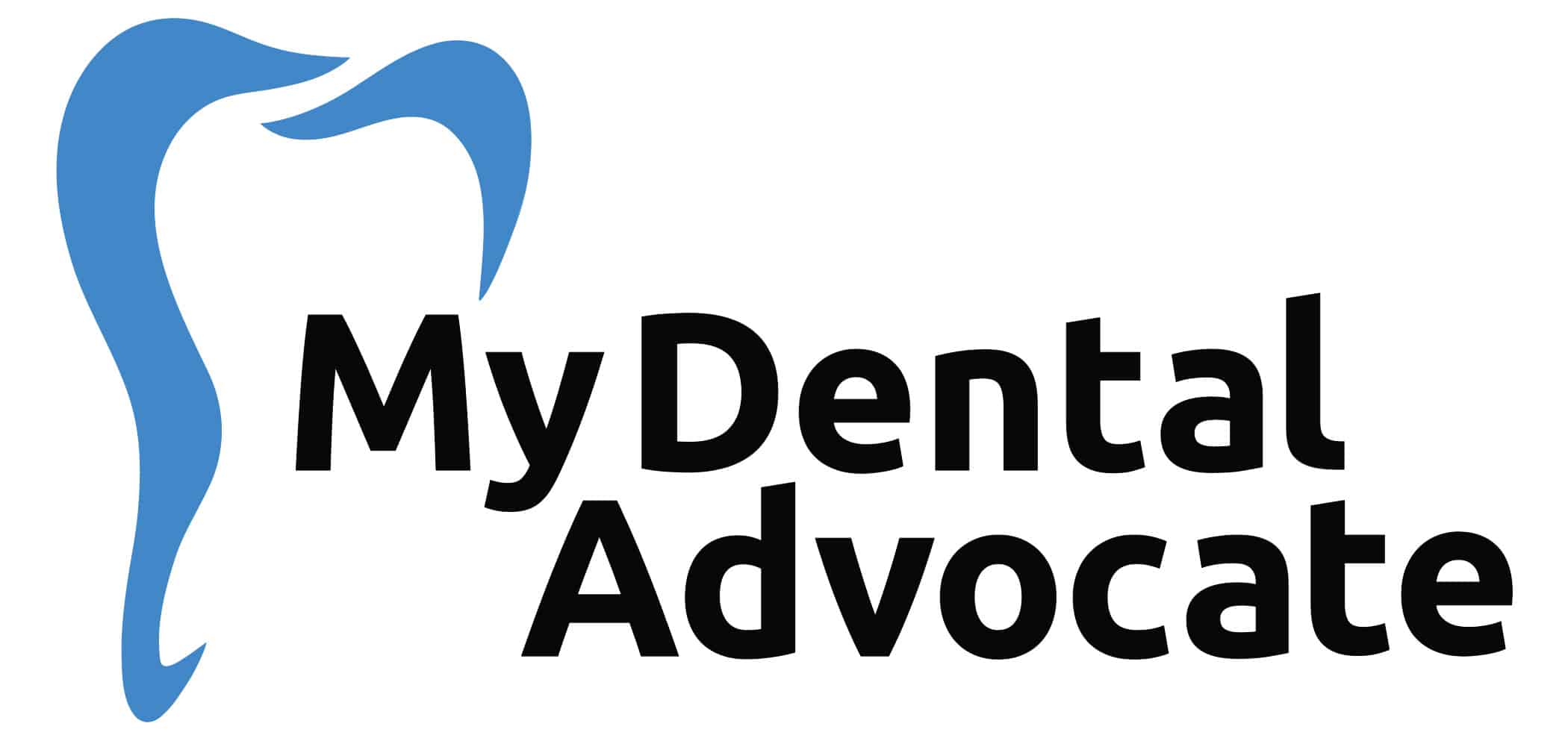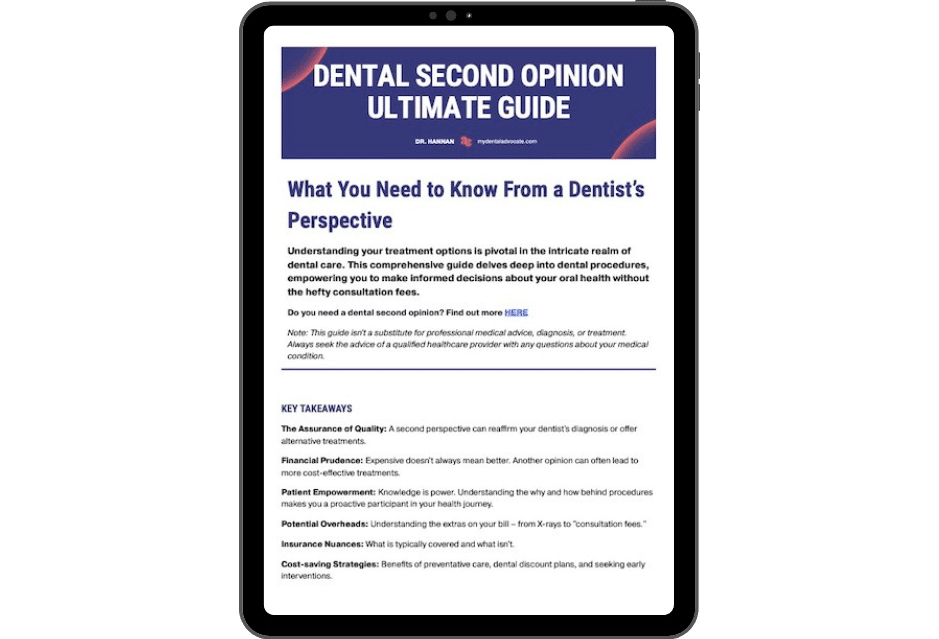Why Dentists Recommend Different Crown Options & Materials
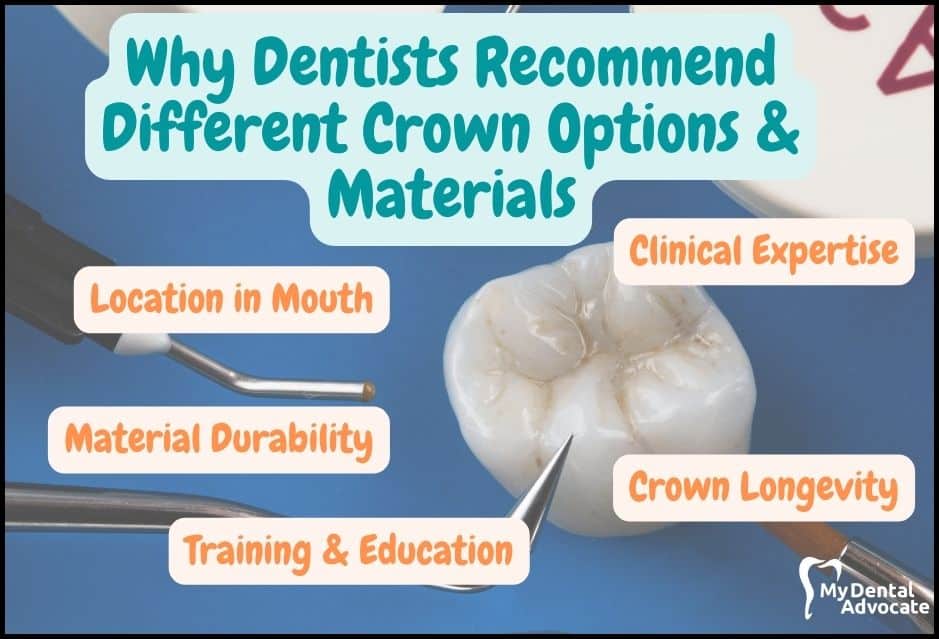
When considering dental crowns, it is essential to understand that dentists may have different opinions and recommendations regarding the necessity and materials used for the procedure.
This issue can be a real head-scratcher for patients. As a dentist, there are many factors to this dilemma.
This can be due to their experience level, personal preferences, and the latest technologies available.
As a result, seeking a second opinion before making any decisions about your dental health can be beneficial.
Need Dental Advice? Ask Dr. Hannan!
My (Dentist) Thoughts
After years of training, education and clinical practice, there are many reasons why dentists have varying opinions.
For example, I’ve encountered many patients confused and frustrated with their previous dentist’s treatment plan.
Our diagnosis and recommended treatment plan are often similar; however, occasionally, I disagree. Why is that? Well when it comes to a dental crown there are many factors to consider.
For example, does the patient grind or clench their teeth? If so, a filling may fracture and break under stress load, whereas a crown would be more durable and provide longevity.
Key Factors
- Clinical expertise
- Location of the tooth in mouth
- Material durability
- Crown longevity
- Training & education
Let’s look more in-depth at other factors, including dental crown materials, dental insurance and practice location.
Different Crown Options
Different material options are available for dental crowns.
Traditional options include gold, porcelain-fused-to-metal, and base metal alloys. However, newer options such as zirconia, lithium disilicate, and e.max have become increasingly popular due to their durability and aesthetic appeal.
In addition, it’s now possible for porcelain crowns and occasionally zirconia crowns to be fabricated and delivered in-office the same day. Therefore, the dentist will need unique scanning, designing and milling equipment.
The most common technology is CAD/CAM units. Some dentists may recommend these crown options over traditional ones, depending on the patient’s needs and goals.
Additionally, dentists may have different opinions on the necessity of a dental crown. For example, some dentists may recommend a filling instead of a crown for a less invasive option.
Others may recommend a crown as a long-term solution for a heavily decayed or damaged tooth. In addition, if you grind or clench your teeth, a crown will be more durable.
An inlay, onlay or partial crown may be recommended if a filling is inadequate and a crown would be overkill. An onlay or partial crown covers only a portion of the tooth, leaving healthy tooth structure remaining to support the restoration.
Seeking a second opinion can provide you with alternative treatment options and ensure that the recommended treatment is appropriate for your needs.
Recommended Reading: 10 Reasons You Need a Second Opinion on Dental Work (Dentist’s Thoughts)Different Crown Materials
When seeking a second opinion, it is vital to look for a provider who has the necessary experience and expertise in the procedure.
Also, be sure they are up-to-date on the latest techniques and technologies and are willing to take the time to answer all of your questions and explain the risks and benefits associated with the procedure.
Several different types of materials can be used. Each type of material has unique benefits and drawbacks, and the best option for you depends on your individual needs and goals.
Traditional Options
- Gold Crowns: Known for durability and longevity, gold crowns are suitable for those with allergies to other materials. However, their yellowish appearance makes them less aesthetically appealing.
- Porcelain-Fused-to-Metal (PFM): PFM crowns, combining porcelain and metal, offer strength and color matching with natural teeth. Their downside is potential weakness and the metal layer sometimes showing at the edges.
- Base Metal Alloys: These crowns are cost-effective and strong. However, their visible, grayish appearance in the mouth may not be the most attractive option.
Newer Options
- Zirconia Crowns: Made from strong, durable ceramic, zirconia crowns look natural and match your teeth’s color. They’re biocompatible, hypoallergenic, and have a lifelike translucency.
- Lithium Disilicate: This glass ceramic offers a natural appearance and is both strong and durable. It’s suitable for multi-unit bridges and implant restorations.
- E.max: A type of lithium disilicate, E.max is known for its strength, durability, and aesthetic qualities. It’s wear-resistant and can be color-matched to your natural teeth.
The choice of material for your crown will affect your treatment’s longevity and success.
Your dentist may recommend a specific type of crown material based on the tooth’s location, function, aesthetics, health, function, and personal preferences.
Recommended Reading: Should I get a Second Opinion on Cavities? (Potentially Save Thousands)Factors to Consider
Regarding dental treatment, the cost is often a primary consideration for patients.
Dental crowns, in particular, can be a significant investment, and it’s essential to understand the costs associated with the procedure and how to ensure you are getting the most cost-effective option for your specific needs.
Recommendations
- Material Costs Vary: Different crown materials come with different price tags. Gold crowns might be pricier than porcelain-fused-to-metal but offer longevity. Zirconia, lithium disilicate, or E.max crowns may cost more but provide superior aesthetics and durability. Assess these costs against your needs and goals.
- Procedure Cost Variability: The cost of dental crowns can differ based on the dentist’s location, expertise, and the materials used. Research local dentists to understand the procedure’s cost.
- Dental Insurance Coverage: Coverage for dental crowns varies across insurance plans. Check with your insurer to understand what’s covered and your potential out-of-pocket expenses.
- Financing Options: Many dental offices offer financing to make crowns more affordable. Understand the terms of these options and how they compare to others.
- Seek a Second Opinion: Getting a second opinion can offer alternative, potentially less expensive treatments that still meet your needs.
- Consider Long-Term Costs: Weigh both immediate and long-term costs. A less expensive option might seem attractive initially but could be less economical over time due to frequent replacements or repairs.
By considering these factors and being proactive in researching the costs associated with dental crowns, you can make an informed decision about the best option for your individual needs and budget.
Recommended Reading: 5 Benefits of a Dental Second Opinion (Dentist’s Perspective)The most important thing is to work with a dentist you trust and willing to discuss all options, costs, and benefits with you, to make the best decision for you and your oral health.
My Dental Advocate Solution
My Dental Advocate provides a valuable service for patients seeking a second opinion on their proposed dental treatment.
By offering asynchronous telehealth consultations, My Dental Advocate allows patients to securely upload their treatment plans and x-rays and receive a response from a board-certified dentist within hours.
We provide a convenient and efficient way to review proposed dental treatment and receive a non-biased report, giving you peace of mind about any expensive dental work you may be considering.
In addition, if patients have any questions or concerns about their treatment, they can reply to the email and message the dentist for further clarification.
My Dental Advocate is a helpful resource for patients looking to ensure they receive the best care for their dental health.
MDA Verification Report
What is the My Dental Verification Report, and why is it important?
Our board-certified dentists will review your case and provide an unbiased second opinion on how you should move forward with your proposed dental treatment.
We respect all dentists suggested treatment.
However, we desire clarity for your dental needs. You should understand what dental work is necessary to move forward with treatment confidently.
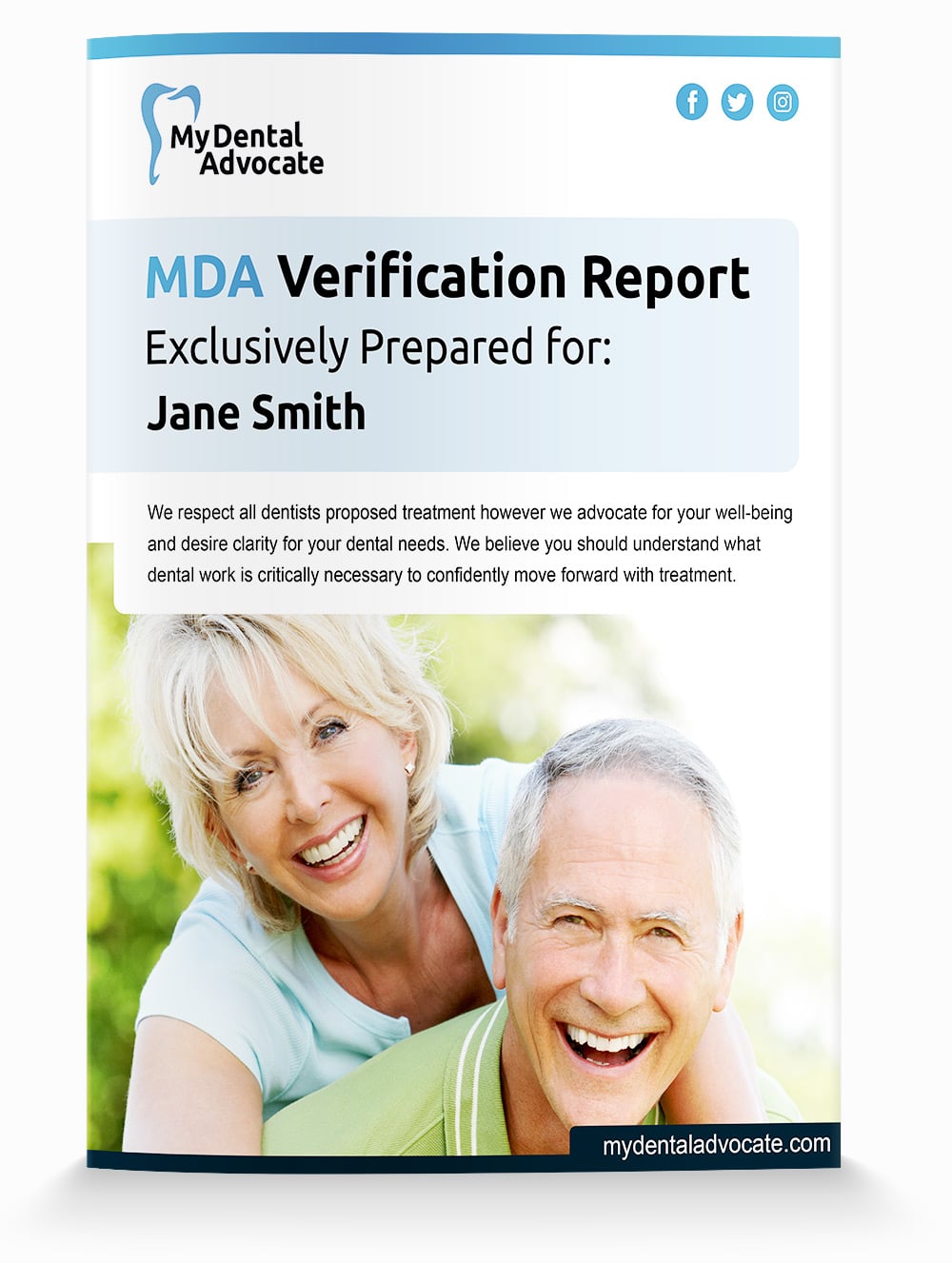
How We Help
- Avoid unnecessary dental treatment
- Potentially save you thousands of dollars
- Information reviewed privately and securely
- Unbiased assessment that brings you peace of mind
- Quick response time to review the report at your convenience
- Clarity and confidence moving forward with dental treatment
- Completed from the comfort of your own home
What’s Involved?
With My Dental Advocate, patients of all ages now have an unbiased, expert second opinion to securely review their proposed dental treatment and gain the knowledge to improve their oral health.
Step 1: Complete Questionnaire
The questionnaire includes a brief medical history, oral hygiene habits, and an opportunity to explain your dental concerns.
Step 2: Upload X-rays
Contact your provider to request your x-rays or take a photo of them at the office. You can also upload dental photos, current treatment plans, periodontal probings, and other supporting documents.
Step 3: Submit Payment
We will privately send your information to a board-certified dentist who will securely assess your case and provide a detailed second opinion for your proposed dental work.
Step 4: Receive MDA Verification Report
We will email your MDA Verification Report second opinion within hours for review at your convenience and from the comfort of your home.
Frequently Asked Questions (FAQ)
My Experience & Expertise
When it comes to dental crowns, it’s important to understand that different dentists may have different opinions and recommendations regarding the necessity and materials used for the procedure.
Seeking a second opinion can provide alternative treatment options and ensure the recommended treatment is appropriate for your needs and goals.
Need a second opinion? We can help! Learn more. Knowledge is power when cultivating healthy dental habits. The more informed you are, the better positioned you’ll be to prevent avoidable and potentially costly dental procedures for you and your family. Watch for future blog posts, where we’ll continue sharing important information, product reviews and practical advice!

About the Author
Dr. Matthew Hannan, also known as “Dr. Advocate,” is a board-certified dentist on a mission to provide accurate dental patient education. He attended Baylor University before completing dental school at UT Health San Antonio School of Dentistry. He now lives in Arizona with his beautiful wife and 4 kids. Dr. Hannan believes everyone should access easy-to-read dental resources with relevant, up-to-date dental research and insight to improve their oral health.

Connect with Dr. Hannan!
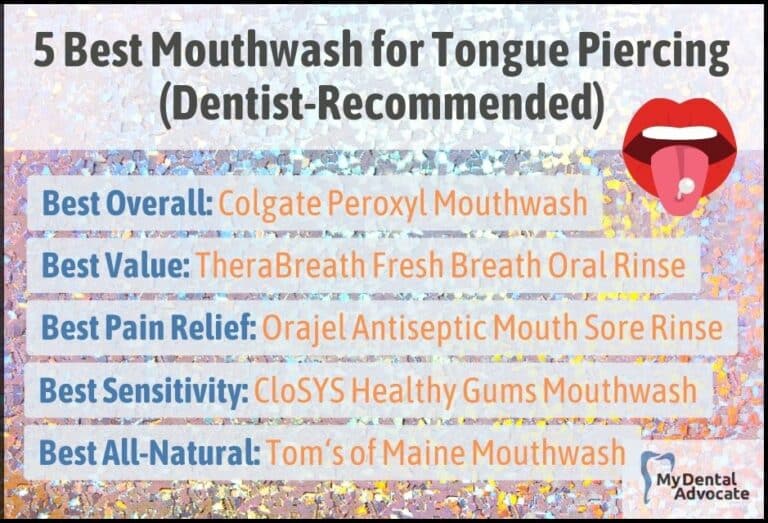
5 Best Mouthwash for Tongue Piercing 2024 (Dentist Recommended)
Navigating oral hygiene after getting a tongue piercing can be a challenging task. A piercing introduces a foreign object into your oral environment, making it a potential breeding ground for bacteria.
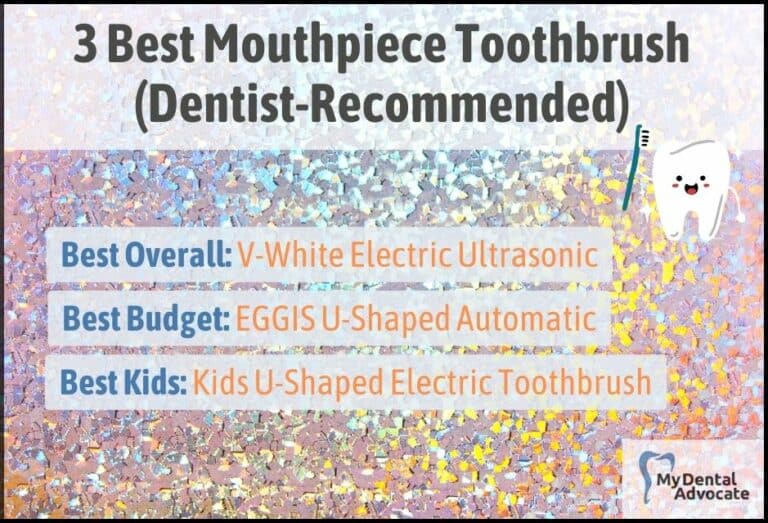
3 Best Mouthpiece Toothbrush 2024 (Dentist-Recommended)
Welcome to the cutting edge of oral hygiene, where innovation meets practicality in the form of a mouthpiece toothbrush. Gone are the days of manual brushing, where each tooth fights for its fair share of attention. In its place, a new dawn of dental care emerges: the mouthpiece toothbrush, designed for absolute coverage and unmatched convenience.
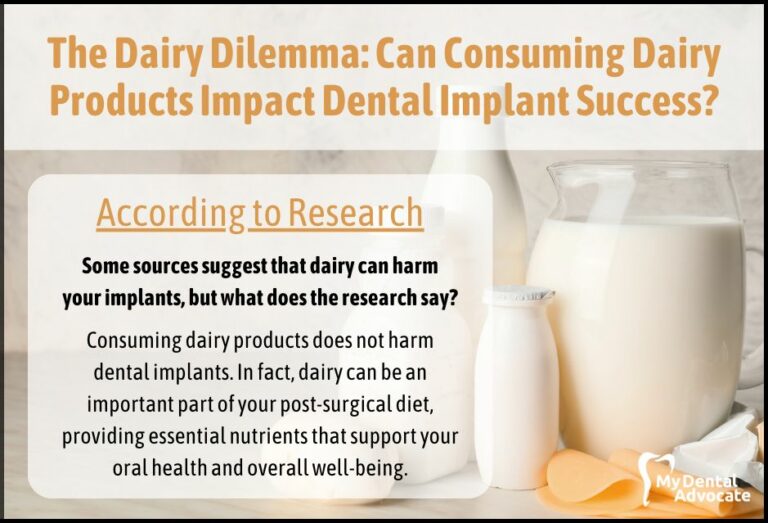
The Dairy Dilemma (Can Consuming Dairy Products Impact Dental Implant Success?)
According to recent research, consuming dairy after dental implants can be highly beneficial for your oral health. So, let’s dive in and discover how dairy can support your dental implant success from a dentist’s perspective…
Gain Clarity with Our FREE Second Opinion Guide
Receive clear, expert second opinions online within 48 hours. Start today!
Product Reviews
Our 250+ dental product reviews (and counting), curated by an experienced dentist, are the most comprehensive online.
Toothbrush Genie
State-of-the-art chatbot designed to help you discover your perfect toothbrush in just a few simple steps!
Cavity Risk Assessment
Cutting-edge digital tool designed to evaluate your individual cavity risk based on your responses to a series of questions.
Gum Disease Assessment
Discover your gum disease risk with our quick and engaging 6-question assessment!
